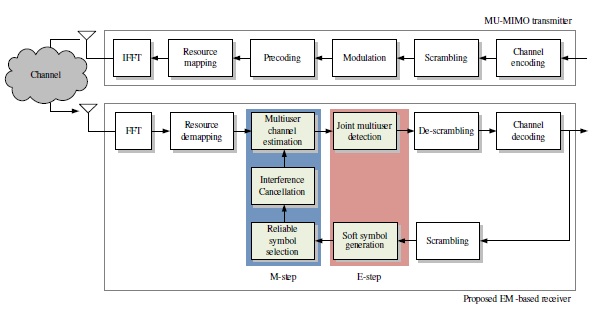- ALL COMPUTER, ELECTRONICS AND MECHANICAL COURSES AVAILABLE…. PROJECT GUIDANCE SINCE 2004. FOR FURTHER DETAILS CALL 9443117328


Projects > ELECTRONICS > 2017 > IEEE > COMMUNICATION
Multiuser multiple-input multiple-output (MUMIMO) transmission techniques have been popularly used to improve the spectral efficiency and user experience. However, due to the coarse knowledge of channel state information at the transmitter (CSIT), the quality of transmit precoding to control multiuser interference is degraded and hence co-scheduled user equipment (UE) may suffer from large residual multiuser interference. In this paper, we propose a new channel estimation technique employing reliable soft symbols to improve the channel estimation and subsequent detection quality of MU-MIMO systems. To this end, we pick reliable data tones from both desired and interfering users and then use them as pilots to re-estimate the channel. In order to jointly estimate the channel and data symbols, we employ the expectation maximization (EM) algorithm where the channel estimation and data decoding are performed iteratively. From numerical experiments in realistic MU-MIMO scenarios, we show that the proposed method achieves substantial performance gain in channel estimation and detection quality over conventional channel estimation approaches.
Soft Iterative Channel Estimation, Channel Estimation Algorithm
An aim of this paper is to propose an improved channel estimation technique for the multiuser MIMO systems. The proposed method exploits the channel information at the data tones to improve the channel estimation and subsequent detection quality. Towards this end, we pick a small number of reliable data tones and then use them for virtual pilots to generate the refined channel estimates. Our framework is based on the expectation maximization (EM) algorithm, where the channel estimation and data decoding are performed iteratively to generate the joint estimate of the channel and data symbols. The EM algorithm is computationally efficient means to solve the maximum likelihood (ML) and maximum a posteriori (MAP) estimation problems. Our proposed method is distinct from previous efforts in the following two aspects. First, we modify the original EM algorithm such that the soft information delivered from the channel decoder is incorporated into the cost metric in the Estep. Since the soft information generated from the channel decoder is more accurate than the output of the MIMO detector, we employ the feedback from the channel decoder as a prior information of the data symbols. We observe from numerical evaluations that use of feedback from the channel decoder improves both the convergence speed and the quality of channel estimation. Second, in order to reduce the computational complexity associated with the virtual pilot selection, we choose a small group of reliable data tones making a dominant contribution to the channel estimation quality. To do so, we design a mean square error (MSE) based data tone selection strategy. We show from numerical simulations in LTE-Advanced and LTE-Advanced-Pro scenarios that the proposed channel estimator outperforms conventional minimum mean square error (MMSE) scheme, which is most popular and has been used as a baseline in many real systems, and also existing EM-based channel estimation technique, especially in the scenario where the present multiuser MIMO systems fails to operate due to the insufficient pilot resources and the inaccurate precoding operation.
BLOCK DIAGRAM
